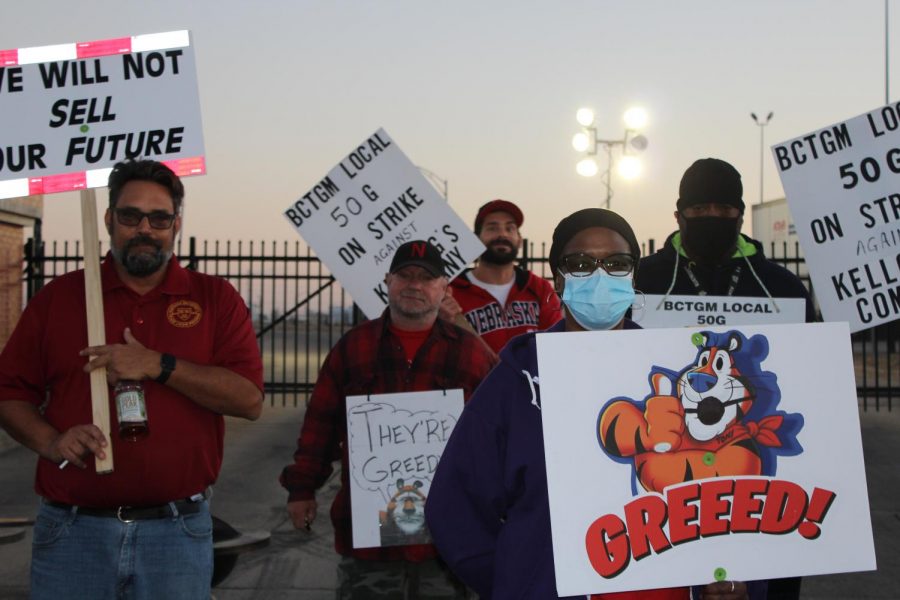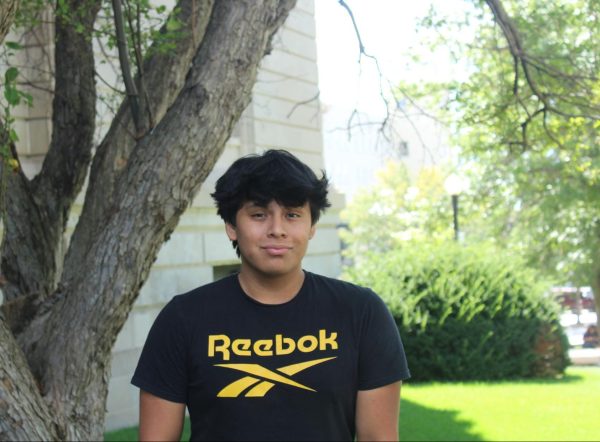Omaha Kellogg’s workers strike
Striking employees stand at the Kelloggs’s factory gates with protest signs.
November 2, 2021
It’s a chilly October night in Omaha’s industrial district, and the sun is already going down at the Kellogg’s plant. But employees here aren’t going home any time soon – they’re here to strike. Workers are positioned at each entrance gate to the factory, with signs that read “Shame on Kellogg’s”, “Unfair Labor Practice” and “Fighting Corporate Greed”.
The strike, which is being organized by the Bakery, Confectionery, Tobacco Workers and Grain Millers Union (BCTGM), began on October 5th over disagreements with the company about a new labor contract. In addition to Omaha, employees at other Kellogg’s cereal producing plants in Michigan, Pennsylvania and Tennessee are also on strike.
The strike has come as a result of building tension between Kellogg’s and BCTGM over contract negotiation. One main complaint by the union is that Kellogg’s proposed contract expands the company’s two-tiered pay system, which divides employees into two categories: legacy and transitional. Legacy workers are those who have been with the company for a long period of time, while transitionals are newer hires.
With the old labor contract, Kellogg’s has been limited to having no more than 30 percent of all employees be transitional workers, who are paid less than legacy workers. But now, the company wants to use the new contract to remove this limit, effectively allowing themselves to bring in as many transitional employees as they would like.
According to BCTGM, this move will eventually remove legacy workers altogether and allow Kellogg’s to pay employees less. Union member Jason Davis believes that this change will prevent new hires from having a path the success within the company. “Transitional employees work for lesser pay, a lesser benefit package and no pension,” said Allan Grzebielski, a union member who’s been working in production at Kellogg’s for 17 years. “Now’s the time to draw the line in the sand.”
Another reason workers are striking is to protect their cost of living (COL) from being cut. COL is what adjusts employee’s pensions for inflation over time. “We’re not out here asking for anything new, and that’s what’s most troubling about this whole thing,” said union member Jason Davis. “We’re just asking to keep what we had.”
Other striking employees bring up how Omaha’s Kellogg’s factory kept its doors open throughout the entire COVID-19 pandemic. This meant employees kept working, even when it meant risking contracting the virus. According to production worker Victor Francia, at the height of COVID workers would consistently have to come in early and stay late to make up for other employees who were out sick.
“Some other manufactures gave their employees wage increases. We didn’t get any raise. A lot of us thought, you know we’re doing all this, maybe when it’s contract time we’ll get some benefits, but obviously that hasn’t happened,” said Francia.
One of the general feelings shared by strikers camped out Kellogg’s is disdain for corporate greed. They cite the fact that the CEO of Kellogg’s earns more than 11 million dollars a year, while simultaneously trying to make cuts from employee’s salaries. They also feel it’s important to note that the company actually increased profits during the pandemic, but despite this is still trying to pay production workers less.
This pushback towards corporate greed is being seen on a wide scale level around the country. Just this month, about 10,000 John Deere employees walked out in solidarity with their union. Additionally, an increasing number of lawmakers are advocating for a higher minimum wage.
At Kellogg’s, Davis says, “What I’m hearing from people out here is that we’re ready to go one day longer than the company will. We just want what’s fair.”
“There’s several generations of workers here. People’s moms work out here, their dads work out here, they’re out here, their kids are out here,” said Jason Davis. “There are three and four generations that have lived and worked at this plant and brought it to where it’s at today. So we’re out here protecting our future.”














